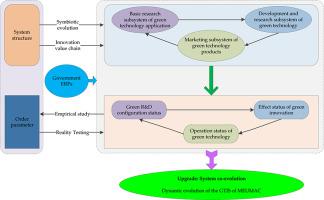当前位置:
X-MOL 学术
›
Environ. Impact Assess. Rev.
›
论文详情
Our official English website, www.x-mol.net, welcomes your
feedback! (Note: you will need to create a separate account there.)
Enhancing the effectiveness of multi-agent cooperation for green manufacturing: Dynamic co-evolution mechanism of a green technology innovation system based on the innovation value chain
Environmental Impact Assessment Review ( IF 9.8 ) Pub Date : 2021-01-01 , DOI: 10.1016/j.eiar.2020.106475 Shi Yin , Nan Zhang , Baizhou Li , Hengmin Dong
Environmental Impact Assessment Review ( IF 9.8 ) Pub Date : 2021-01-01 , DOI: 10.1016/j.eiar.2020.106475 Shi Yin , Nan Zhang , Baizhou Li , Hengmin Dong

|
Abstract A virtuous cycle of the green technology innovation (GTI) system (GTIS) can not only effectively serve GTI subjects in the system but also fully improve green manufacturing and reduce environmental pollution. The essence of the GTIS evolution of manufacturing enterprises (MEs) under multi-agent cooperation (MEUMAC) is encouraged by governments and led by MEs, which jointly promote the process of GTIS from low-end to high-end through interaction with universities, research institutions, supply chains, intermediaries and consumers. MEs cooperate with multiple GTI subjects to continuously improve the GTI level of MEUMAC, and the subsystems of the GTIS interact and coordinate dynamically. To promote the upgrade of the GTIS under multi-agent cooperation, the dynamic co-evolution mechanism of the GTIS needs to be explored. Innovation process is a value chain that transforms from knowledge creation to product promotion based on the innovation value chain. Based on system theory, this process can be solved through five parts: input, processing, output, feedback and upgrade. The structure and evolution path of the GTIS were analysed based on the innovation value chain theory and system theory. Logistic symbiotic response system is a typical system with self-organization characteristics, and the development law of the GTIS of MEUMAC is similar with the symbiotic system. Hence, an evolution model based on a Logistic model was constructed to determine state and control variables. The results show that the evolution of the GTIS of MEUMAC is the spatial advancement and temporal evolution of the system under the action of internal and external subjects, which is ultimately manifested as the process of the GTI performance output. The operation status of green technology is a key factor in the dynamic co-evolution of the GTIS of MEUMAC, which is the order parameter of the system. Environmental regulation policies (ERPs) have a strong positive incentive effect on the dynamic co-evolution of the GTIS of MEUMAC. Regarding the current ERPs, the effect intensity of different policies is command regulation, market regulation, public participation regulation and voluntary action regulation. The results of this study not only help MEs to optimize the implementation process of the GTIS and provide practical guidance to formulate ERPs but also extend the theoretical system of co-evolution and enrich the innovation value chain theory.
中文翻译:

提高绿色制造多主体合作的有效性:基于创新价值链的绿色技术创新系统动态协同演化机制
摘要 绿色技术创新(GTI)系统(GTIS)的良性循环不仅可以有效服务于系统中的GTI主体,而且可以全面提升绿色制造水平,减少环境污染。多代理合作(MEUMAC)下制造企业(MEs)GTIS演进的本质是政府鼓励,MEs主导,通过与大学、研究机构的互动,共同推动GTIS从低端到高端的进程机构、供应链、中间商和消费者。ME与多个GTI主体合作,不断提升MEUMAC的GTI水平,GTIS各子系统动态交互协调。为促进多智能体合作下GTIS的升级,需要探索GTIS的动态协同进化机制。创新过程是基于创新价值链从知识创造到产品推广的价值链。根据系统理论,这个过程可以通过五个部分来解决:输入、处理、输出、反馈和升级。基于创新价值链理论和系统理论,分析了GTIS的结构和演进路径。后勤共生反应系统是具有自组织特征的典型系统,MEUMAC GTIS的发展规律与共生系统相似。因此,构建了基于 Logistic 模型的演化模型来确定状态和控制变量。结果表明,MEUMAC GTIS 的演化是系统在内外主体作用下的空间推进和时间演化,最终表现为GTI性能输出的过程。绿色技术的运行状态是MEUMAC GTIS动态协同演化的关键因素,是系统的有序参数。环境监管政策(ERPs)对 MEUMAC GTIS 的动态协同演化具有很强的正向激励作用。就现行的ERP而言,不同政策的效果强度分别为指令性监管、市场监管、公众参与监管和自愿行为监管。本研究的结果不仅有助于ME优化GTIS的实施过程,为ERP的制定提供实践指导,而且扩展了协同进化的理论体系,丰富了创新价值链理论。绿色技术的运行状态是MEUMAC GTIS动态协同演化的关键因素,是系统的有序参数。环境监管政策(ERPs)对 MEUMAC GTIS 的动态协同演化具有很强的正向激励作用。就现行的ERP而言,不同政策的效果强度分别为指令性监管、市场监管、公众参与监管和自愿行为监管。研究结果不仅有助于ME优化GTIS的实施过程,为ERP的制定提供实践指导,而且扩展了协同进化的理论体系,丰富了创新价值链理论。绿色技术的运行状态是MEUMAC GTIS动态协同演化的关键因素,是系统的有序参数。环境监管政策(ERPs)对 MEUMAC GTIS 的动态协同演化具有很强的正向激励作用。就现行的ERP而言,不同政策的效果强度分别为指令性监管、市场监管、公众参与监管和自愿行为监管。研究结果不仅有助于ME优化GTIS的实施过程,为ERP的制定提供实践指导,而且扩展了协同进化的理论体系,丰富了创新价值链理论。环境监管政策(ERPs)对 MEUMAC GTIS 的动态协同演化具有很强的正向激励作用。就现行的ERP而言,不同政策的效果强度分别为指令性监管、市场监管、公众参与监管和自愿行为监管。研究结果不仅有助于ME优化GTIS的实施过程,为ERP的制定提供实践指导,而且扩展了协同进化的理论体系,丰富了创新价值链理论。环境监管政策(ERPs)对 MEUMAC GTIS 的动态协同演化具有很强的正向激励作用。就现行的ERP而言,不同政策的效果强度分别为指令性监管、市场监管、公众参与监管和自愿行为监管。本研究的结果不仅有助于ME优化GTIS的实施过程,为ERP的制定提供实践指导,而且扩展了协同进化的理论体系,丰富了创新价值链理论。
更新日期:2021-01-01
中文翻译:

提高绿色制造多主体合作的有效性:基于创新价值链的绿色技术创新系统动态协同演化机制
摘要 绿色技术创新(GTI)系统(GTIS)的良性循环不仅可以有效服务于系统中的GTI主体,而且可以全面提升绿色制造水平,减少环境污染。多代理合作(MEUMAC)下制造企业(MEs)GTIS演进的本质是政府鼓励,MEs主导,通过与大学、研究机构的互动,共同推动GTIS从低端到高端的进程机构、供应链、中间商和消费者。ME与多个GTI主体合作,不断提升MEUMAC的GTI水平,GTIS各子系统动态交互协调。为促进多智能体合作下GTIS的升级,需要探索GTIS的动态协同进化机制。创新过程是基于创新价值链从知识创造到产品推广的价值链。根据系统理论,这个过程可以通过五个部分来解决:输入、处理、输出、反馈和升级。基于创新价值链理论和系统理论,分析了GTIS的结构和演进路径。后勤共生反应系统是具有自组织特征的典型系统,MEUMAC GTIS的发展规律与共生系统相似。因此,构建了基于 Logistic 模型的演化模型来确定状态和控制变量。结果表明,MEUMAC GTIS 的演化是系统在内外主体作用下的空间推进和时间演化,最终表现为GTI性能输出的过程。绿色技术的运行状态是MEUMAC GTIS动态协同演化的关键因素,是系统的有序参数。环境监管政策(ERPs)对 MEUMAC GTIS 的动态协同演化具有很强的正向激励作用。就现行的ERP而言,不同政策的效果强度分别为指令性监管、市场监管、公众参与监管和自愿行为监管。本研究的结果不仅有助于ME优化GTIS的实施过程,为ERP的制定提供实践指导,而且扩展了协同进化的理论体系,丰富了创新价值链理论。绿色技术的运行状态是MEUMAC GTIS动态协同演化的关键因素,是系统的有序参数。环境监管政策(ERPs)对 MEUMAC GTIS 的动态协同演化具有很强的正向激励作用。就现行的ERP而言,不同政策的效果强度分别为指令性监管、市场监管、公众参与监管和自愿行为监管。研究结果不仅有助于ME优化GTIS的实施过程,为ERP的制定提供实践指导,而且扩展了协同进化的理论体系,丰富了创新价值链理论。绿色技术的运行状态是MEUMAC GTIS动态协同演化的关键因素,是系统的有序参数。环境监管政策(ERPs)对 MEUMAC GTIS 的动态协同演化具有很强的正向激励作用。就现行的ERP而言,不同政策的效果强度分别为指令性监管、市场监管、公众参与监管和自愿行为监管。研究结果不仅有助于ME优化GTIS的实施过程,为ERP的制定提供实践指导,而且扩展了协同进化的理论体系,丰富了创新价值链理论。环境监管政策(ERPs)对 MEUMAC GTIS 的动态协同演化具有很强的正向激励作用。就现行的ERP而言,不同政策的效果强度分别为指令性监管、市场监管、公众参与监管和自愿行为监管。研究结果不仅有助于ME优化GTIS的实施过程,为ERP的制定提供实践指导,而且扩展了协同进化的理论体系,丰富了创新价值链理论。环境监管政策(ERPs)对 MEUMAC GTIS 的动态协同演化具有很强的正向激励作用。就现行的ERP而言,不同政策的效果强度分别为指令性监管、市场监管、公众参与监管和自愿行为监管。本研究的结果不仅有助于ME优化GTIS的实施过程,为ERP的制定提供实践指导,而且扩展了协同进化的理论体系,丰富了创新价值链理论。











































 京公网安备 11010802027423号
京公网安备 11010802027423号